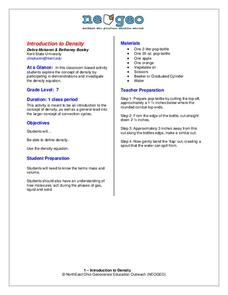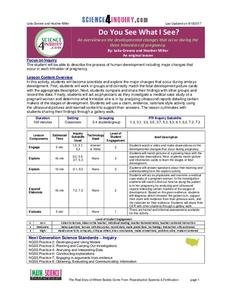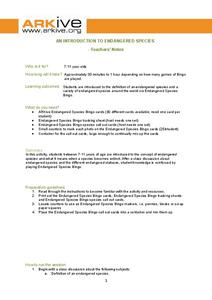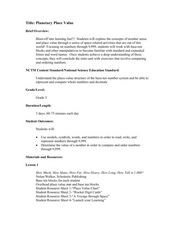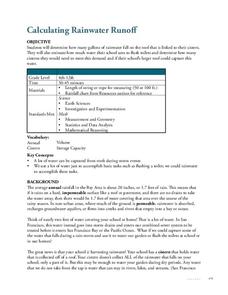Pace University
Grade 7 Earth Day Statistics with Circle and Bar Graphs
Take a tiered approach to studying waste. The lesson uses Earth Day to present differentiated instruction around using circle and bar graphs. Each group gets a cube based on their tiers and works collaboratively as well as individually...
Curated OER
Tracing and Counting
For this counting worksheet, pupils trace the numbers from 1 to 10. Students count and color the animals and tell how many are animals that live in the water.
Omaha Zoo
I Like to Move It
What do lemurs do best? They move! Lemurs like to jump, run, hop, and climb and it's your class's job to document seven fun lemur behaviors. The class starts by discussing why lemurs are considered primates, and then they isolate seven...
Information is Beautiful
How Many Gigatons of Carbon Dioxide...?
Here is an interesting infographic that presents information on the amount of carbon dioxide we can safely release into the atmosphere compared to the actual amount we have released to date.
WakeGOV
Plastic Sight Words
Plastic math? Have young learners count and name the number of plastic items in their centers. Kindergartners match sight word cards to the number of plastics in a given group, while learning that plastics come in all different shapes,...
Curated OER
Using Environmental Models to Determine the Effect of Acid Rain on an Ecosystem
Demonstrate to your middle school science learners how chalk breaks down in a weak acid. Discuss what affects acidic rain might have on ecosystems. Lab groups then choose one of two questions: "How does acid precipitation affect an...
Shelby County Schools
Atomic Structure Worksheet
Teaching young scientists about atoms is no small task, but this series of worksheets will make it a little easier. From creating and labeling Bohr models, to identifying information provided in the periodic table of elements,...
NorthEast Ohio Geoscience Education Outreach
Introduction to Density
Seventh grade scientists weigh in on the concept of density. In a nutshell, they participate in the following activities:
Measurement of the mass and volume of fruit in order to compare densities
Measurement of the mass of oil and water...
Science 4 Inquiry
Do You See What I See?
In only nine months, a small group of cells grows into a fully developed baby. Pupils learn about the development of an embryo to a fetus to a baby. They identify each step of weekly development. Young scientists look at ultrasounds to...
Curated OER
WS 7.4 Ideal Gas Law
In this ideal gas law worksheet, students solve eighteen problems using the ideal gas law to solve for moles of gases, temperature of gases, pressure of gases or volumes of gases.
Curated OER
Who Wants to Be a Millionaire: The Heart
Using an interactive game, learners can explore information relating to the human heart. This would be the perfect way to have students review information learned about the human body. The presentation could be altered for use with a...
Curated OER
How To Build a Planet From The Inside Out!
High schoolers read about the Spitzer Space Telescope and the technology used to learn about planet composition. They calculate the radius of a planet, the size of a planet, the average density of a planet and the likely core composition...
ARKive
An Introduction to Endangered Species
Playing games is a wonderful way to practice skills, start a discussion, or build memory. First, the class discusses extinction and conservation, and then they play a game of bingo. The game cards are printable and include images of...
Curated OER
How Many Apple Seeds?
Students complete activities for an apple themed instructional activity. In this math and language arts instructional activity, students read an apple book and guess how many seeds are in an apple. Students draw pictures of apples and...
NWT Literacy Council
Readers Theatre Scripts
Engage and entertain young learners with this collection of readers theatre activities. With over 25 different scripts, a wide range of topics are covered from simple counting and rhyming exercises to adaptions of popular children's...
Creative Chemistry
Displacement Reactions of the Halogens
During this lab activity, chemists discover the reactivities of chlorine, bromine, and iodine as examples of the halogens. They use a displacement reaction as a test by adding other compounds and observing for a color change. The lab...
Curated OER
Planetary Place Value
Third graders explore place value to the ten thousands place. This incredibly thorough, 24-page lesson has learners construct, order, and compare numbers to 9,999. This three-day lesson includes reteaching and extension activities...
Techbridge Curriculum
Calculating Rainwater Runoff
Thirsty plants soak up every bit of a rainfall, but what happens to the rain that hits the roof? Calculate the amount of rainwater from your school's roof with an Earth science activity, which brings measurement skills, observation...
Savvas Learning
Let's Get Moving
Scholars examine, cut, paste, and sort 12 images featuring different types of movement in order to show what they know about energy—potential and kinetic.
Teach Engineering
How Big? Necessary Area and Volume for Shelter
Teams must determine the size of cavern needed to house the citizens of Alabraska to protect them from the asteroid impact. Using scaling properties, teams first determining the number of people that could sleep in a classroom and then...
Science Matters
Richter Scale
The 12th lesson in a series of 20 opens with a demonstration of exponential functions using pasta. This concept is connected to the Richter Scale, which is also an exponential function. Scholars compare the exponential scale that...
Chicago Botanic Garden
Calculating Your Ecological Footprint
You can lower your ecological footprint by recycling! Lesson four in this series of five has individuals, through the use of a computer, calculate their ecological footprints. Through discussions and analysis they determine how many...
Virginia Department of Education
Weather Patterns and Seasonal Changes
Get your class outside to observe their surroundings with a lesson highlighting weather patterns and seasonal changes. First, learners take a weather walk to survey how the weather affects animals, people, plants, and trees during...
PBS
Stories of Painkiller Addiction: Contemplating Nature vs. Nurture
Does having an addict in your family make it more likely to become one yourself? Explore the genetic risk factors, as well as the prominent environmental influences, for substance addiction in a lesson that encourages awareness and open...







